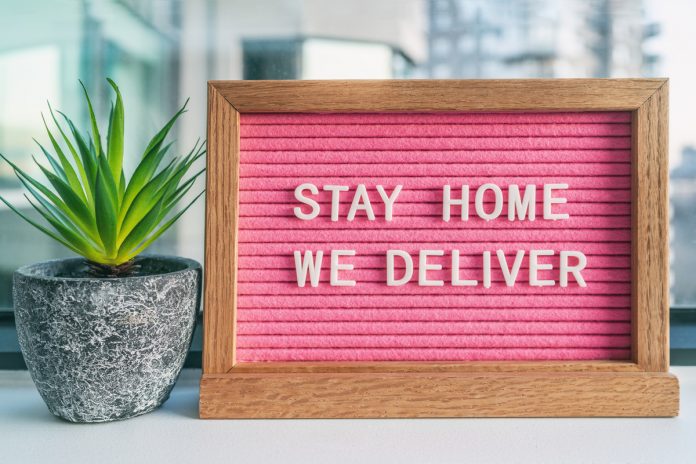
As the world responds to the COVID-19 health crisis, cannabis brands and retailers are facing a new normal when it comes to running their businesses. Retailers have had to adapt and innovate in response to social distancing regulations, and while stay-home restrictions will lift at some point, it is unclear if consumer habits will ever return to their original state. Even after the country returns to work, businesses must be prepared for certain behaviors to become permanent fixtures of the shopping experience.
Because the cannabis industry is still young, consumer and business norms are still developing. In many ways, coronavirus may just be a spark that accelerates the structural shifts we’ve seen in more traditional retail industries over the last decade. At cannabis wholesale marketplace LeafLink, my team and I have spent the past several weeks speaking with our network of more than 6,000 cannabis brands and retailers to learn as much as possible about how these changes—both in regulations and consumer behaviors—are impacting their businesses and how we can continue to support them. Based on our conversations, these are our predictions for which responses are most likely to stick and become fixtures of cannabis retail after the pandemic subsides.
Faster conversion to online ordering and delivery
For years, retailers across many industries have struggled as consumers abandoned brick-and-mortar outlets for the convenience of e-commerce. Now, in the face of stay-home orders, cannabis retailers must embrace online channels in order to survive and they must encourage customers to adopt delivery or pre-order services.
In nearly every legal medical and recreational market in the United States, cannabis dispensaries, like liquor stores and pharmacies, have been deemed “essential businesses,” during the shutdown. This is an incredible win for the cannabis industry but comes with a new set of challenges around how to operate in a socially distanced world. States and localities that once were reluctant to allow cannabis delivery and online ordering services have now relaxed their stances in order to give consumers access to cannabis while upholding social distancing protocols.
It was a shock to the industry at first; online cannabis ordering was illegal in many states prior to COVID-19, and some governments had to legalize this technology before businesses could even adopt it. Now, some services are reporting spikes in online sales, demand, and first-time orders. After less than two months, cannabis retailers and consumers have adapted and are relying on options like online ordering, curbside pickup, delivery, or drive-through. Regardless how social distancing evolves, these new regulations will be hard to backpedal. This could in turn evolve cannabis e-commerce at warp speed, making it essential for dispensaries to have user-friendly websites and giving consumers increased access to cannabis products from across their region.
Increased urgency for cashless payment options
Structural changes in commerce have also rekindled the conversation around a major industry pain point: cash payments. Up to this point, dispensaries have had to operate without relying on credit card payments due to cannabis’ federal classification as a Schedule I drug. Consequently, transactions are largely conducted in cash. There are many risks and costs associated with cash transactions, but now we can add a new one to the list: fear of infection. While there are a few online payment systems that dispensaries may utilize, none are as secure or reliable as credit cards or tech-first payment platforms like PayPal or Apple Pay. Even now, after online ordering has been legalized in many markets, payment options have yet to catch up and customers still must pay in cash.
Several cannabis attorneys and lobbying groups have encouraged state and federal lawmakers to pass the Secure and Fair Enforcement (SAFE) Banking Act, which aims to protect from federal censure those financial institutions that serve cannabis-related businesses. Pressure to pass the SAFE Act or other bills that reclassify cannabis would be a significant win for the industry. These kinds of bills would bring about increased access for consumers and meaningful protection for business owners. Given the current economic climate, this availability and support is more important now than ever.
New openings for digital community
Many mainstream brands have used the outbreak as an opportunity to leverage creative online tools to reach customers and build community in inspiring ways. Airbnb has launched online experiences to keep their customers “traveling,” and many companies have held remote dance parties to help support local businesses that are struggling without in-person patrons.
Similarly, cannabis brands and retailers have found they can move their in-person services online by providing educational seminars and events remotely. Many tested out the concept in the days leading up to 4/20. Canndescent livestreamed a yoga class on its Instagram page, while From the Earth hosted a one-hour Rock n’ Talk show. Our team has participated in multiple online events over the past few weeks, including the multi-day Business of Cannabis conference, and our client experience team recently hosted a webinar for brands looking to improve their remote workflow.
Taking a cue from telehealth, patient and consumer budtender consultations also are moving online. This model removes barriers such as distance or unreliable transportation while creating more opportunity for retailers to form personal connections with their customers. Appointments can also be easily scheduled, reducing wait times, and improving overall satisfaction and convenience. Once consumers and patients become accustomed to these benefits, it may be hard to convince them that it’s worth reverting back to the in-person-only standard, even after the crisis has ended.
Potential focus on fewer SKUs
As the cannabis industry has grown, so has the variety of products available. As consumers have become more sophisticated and shifted toward consumer packaged goods (CPG) products, dispensaries have prioritized stocking their shelves with a selection that has an increasingly wide appeal. In turn, brands have created vast menus and become more willing to experiment with new products.
However, now may be an ideal time for brands and retailers to take stock of their offerings. During April, flower products made up 31 percent of total sales through LeafLink, increasing market share by 16 percent month-over-month (compared to an average monthly rate of 2 percent during Q1). This increase signals that retailers are shifting their purchasing behavior to keep up with consumer preference. In order to meet demand while dealing with new limitations on production capabilities, brands may start to home in on their most successful products and cut back on underperformers. Similarly, retailers are likely to focus on purchasing “the hits” as opposed to experimenting with new SKUs, both in response to availability from brands and new “stock up” shopping patterns.
While simplifying inventory practices are commonplace among savvy businesses, the shift in the cannabis industry has likely been accelerated by the recent crisis. We may see more companies prioritizing a core set of highly popular products to maximize operational efficiencies and profit. Though it’s still unclear what the long-term impact of this crisis will be on cannabis, it appears that at the very least, it will push businesses in the industry to mature faster.
Shifting use of space
In recent years, many major chains like Target and Kohls have opted for a less-is-more approach by opening smaller outlets in strategic locations to maintain and maximize their brand presence in front of key customers. Thanks to new restrictions around in-person retail, we may see an acceleration in the younger cannabis industry. As dispensary sales and services shift online, stores may discover reducing their real estate footprint will allow them to reallocate capital to improve operations.
A smaller retail space offers several advantages. For one, lower overhead makes it possible to offer more accessible prices. It also affords retailers the option of opening multiple smaller stores in different locations instead of one large centralized location. Dispensaries may find that a small store format can appeal to the modern consumer’s omnichannel shopping habits while simultaneously providing a more sustainable business model.
Like many of the COVID-influenced changes we’re seeing in our own daily lives, the impact on retail is bound to be profound and persist well into the future. Extraordinary events like this pandemic can leave lasting imprints on entire generations even long after they are over. Will any of the above measures last beyond stay at home orders? Maybe. More importantly, I am optimistic the most meaningful impact of COVID-19 on our industry will be the way in which cannabis is viewed by the country as a whole.
While still federally illegal for all intents and purposes, cannabis has been deemed an “essential business” across nearly every U.S. medical and recreational market. This is a huge step forward for the industry, as it acknowledges how important cannabis is to many peoples’ lives. I am hopeful that some of the temporary provisions businesses have invested in, like delivery, will become permanent fixtures within the industry. More importantly, I am confident that, thanks to the cannabis community’s resilience and adaptability, the industry will emerge from this crisis stronger than ever.












